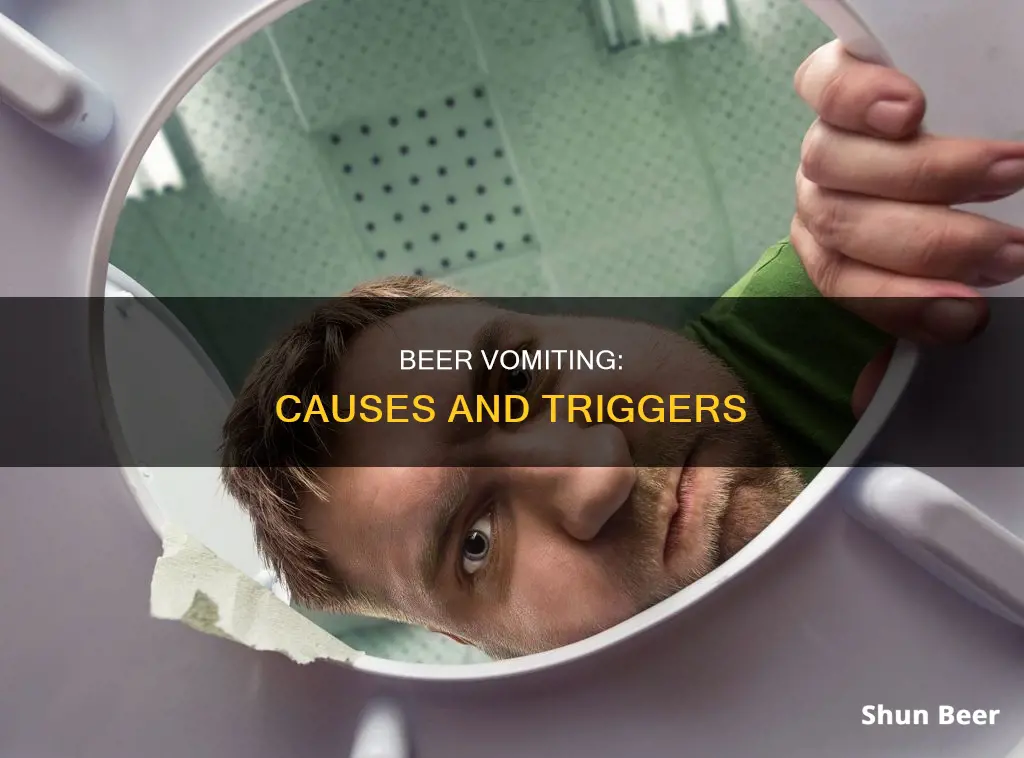
Vomiting after drinking beer or other alcoholic beverages is the body's natural way of removing harmful substances, such as toxins, from the body. When you drink alcohol, your body breaks it down into acetaldehyde, which the liver neutralises with a substance called glutathione. However, when you drink too much, your liver may not be able to keep up, and the excess acetaldehyde is eliminated through vomiting. Additionally, alcohol can irritate the stomach lining, causing a buildup of acid that leads to nausea. Chronic alcohol exposure can also lead to gastritis, characterised by frequent stomach issues such as ulcers, nausea, and acid reflux. Other factors, such as diet, age, medication, and psychological factors, can also influence how the body responds to alcohol.
| Characteristics | Values |
|---|---|
| Reason for vomiting | The body's natural mechanism of removing harmful substances |
| Why it happens | The liver can't process enough of the toxic chemical acetaldehyde, which is produced when the body processes alcohol |
| Other reasons | Alcohol can irritate the stomach lining, causing gastritis and acid reflux |
| Other reasons | Alcoholic ketoacidosis (AKA) |
| Benefits of throwing up | Removes alcohol from the body, reducing its effects |
| How to feel better | Sip water, eat small amounts of easily digestible food, get plenty of rest, take over-the-counter medication |
| When to see a doctor | If vomiting continuously for more than 24 hours, unable to keep fluids or food down, signs of dehydration, seeing blood in vomit, trouble breathing, temperature over 101.5°F/39°C |
What You'll Learn

Alcohol poisoning
Vomiting after drinking beer could be due to several reasons. Binge drinking or consuming excessive amounts of alcohol within a short period can cause vomiting. Binge drinking is defined as drinking enough alcohol to bring one's blood alcohol concentration (BAC) to 0.08% or higher. For men, this typically means consuming five or more drinks within two hours, and for women, it's four or more drinks within the same timeframe.
Drinking alcohol can also cause the stomach to produce more acid than usual, leading to mucosal inflammation known as gastritis. Alcohol-induced gastritis can cause heartburn or recurrent stomach pain, ranging from a burning ache to stabbing pain after drinking.
In addition, vomiting can be the body's natural mechanism of removing potentially harmful substances. When the body processes alcohol, the liver converts it into acetaldehyde, a highly reactive and toxic chemical. If the levels of acetaldehyde are higher than the liver can convert, the body will remove the excess chemical by vomiting.
Vomiting after drinking beer could also be a sign of alcohol intolerance or an allergic reaction to certain ingredients in the beer, such as grains, sulfites, or preservatives.
It's important to note that while vomiting can help remove alcohol from the body and reduce its harmful effects, it can also cause bodily damage. Forcing oneself to vomit can lead to malnutrition, gastroesophageal reflux, lung aspiration, and other serious health issues.
Now, let's shift our focus to alcohol poisoning:
The signs and symptoms of alcohol poisoning include:
- Unconsciousness or semi-consciousness
- Slow respiration (eight or fewer breaths per minute)
- Cold, clammy, pale, or bluish skin
- Strong odor of alcohol
- Difficulty remaining conscious or blacking out
- Slow and irregular breathing
- Extremely low body temperature
If you suspect someone is experiencing alcohol poisoning, it is crucial to act quickly and call for emergency medical assistance. Do not try to self-treat the symptoms, as it can cause more harm than good. While waiting for emergency services to arrive, keep the person in an upright sitting position and make sure they stay awake. Place them on their side to prevent choking if they vomit.
On average, six Americans die each day from alcohol poisoning, and about three out of every four alcohol poisoning deaths affect individuals aged 35 to 64. Alcohol poisoning can lead to permanent brain damage and even death if left untreated. Therefore, it is crucial to seek medical help as soon as possible if you suspect someone is experiencing alcohol poisoning.
Is Beer Safe for Dogs to Drink?
You may want to see also

Body can't keep up
The body can't keep up when you drink alcohol because the liver, which is responsible for neutralizing the byproduct acetaldehyde, can't produce enough of the substance glutathione to process the alcohol. The liver neutralizes acetaldehyde with glutathione, but when you drink too much, the liver can't keep up with the production of glutathione. As a result, the body resorts to getting rid of the excess acetaldehyde through vomiting.
Drinking alcohol in excess can lead to a variety of vomiting symptoms. Vomiting is the body's natural defence mechanism against toxins, and in the case of alcohol, it is trying to rid itself of the toxin acetaldehyde. While vomiting may make you feel unwell for a day or two, prolonged exposure to excess toxins can have long-term effects. It is, therefore, best to let the body do its thing and get rid of the toxins.
The liver's inability to keep up with the production of glutathione can be influenced by various factors. Firstly, age plays a role as the body starts to process alcohol more slowly with advancing years. This means that it takes fewer drinks to become intoxicated, and the effects of alcohol are more pronounced. Secondly, drinking on an empty stomach can increase the chances of feeling unwell as food helps to slow down the rate of alcohol absorption. Eating before drinking can help mitigate the negative effects of alcohol.
Additionally, the type of alcohol consumed can also make a difference. Drinks with higher congeners, which are biologically active compounds that contribute to the taste, smell, and appearance of the beverage, may lead to more severe hangover symptoms, including nausea. Typically, drinks with a higher content of pure alcohol, such as gin or vodka, have fewer congeners compared to drinks with less pure alcohol, like red wine or whiskey.
Furthermore, certain medications can affect how the body metabolises alcohol. For example, aspirin increases the risk of stomach or intestinal bleeding, antihistamines can cause sleepiness, and acetaminophen in large doses can lead to liver damage. It is important to consult with a healthcare provider to understand potential drug interactions and the effects of medications on alcohol metabolism.
Drinking a dozen beers daily: A deadly habit
You may want to see also

Irritated stomach lining
Drinking beer or any other type of alcohol can irritate and damage the stomach lining, causing a condition known as alcoholic gastritis. The walls of our stomachs are sensitive, and exposing them to excessive alcohol can irritate and damage them, leading to abdominal pain and other acute gastric symptoms. Alcoholic gastritis can be caused by a single session of heavy drinking or chronic drinking over a more extended period.
Alcohol can irritate the stomach in several ways. Firstly, it can cause the stomach to produce more acid than usual, leading to a buildup that can irritate and erode the stomach lining. This acid buildup can cause mucosal inflammation, known as gastritis, which can result in heartburn or recurrent stomach pain, ranging from a burning ache to stabbing pain.
In addition to increasing acid production, alcohol can also wear away the stomach lining, making it inflamed and painful. Over time, this can lead to the development of painful ulcers in the stomach lining. These ulcers can cause severe gastrointestinal bleeding, which may require invasive procedures to stop the bleeding and, in some cases, a blood transfusion.
Alcoholic gastritis can also increase the risk of developing other serious medical complications, such as sepsis, peritonitis, stomach tumours, and multiple organ failure. Therefore, it is essential to protect the stomach lining from further harm by avoiding or reducing alcohol consumption and following the recommendations of medical professionals.
Furthermore, drinking alcohol can increase the risk of developing several types of cancer associated with the digestive system, including mouth cancer, pharyngeal cancer, oesophageal cancer, bowel cancer, and liver cancer. It also increases the risk of breast cancer and voice box cancer. Thus, it is crucial to follow low-risk drinking guidelines and make lifestyle changes to reduce the potential harm caused by alcohol consumption.
Beer Bottle or Glass: Which Serves the Best Taste?
You may want to see also

Chronic alcohol exposure
In addition to gastritis, chronic alcohol exposure has been linked to a higher risk of cancer, diabetes, pancreatitis, and cirrhosis of the liver. It is also associated with alcoholic ketoacidosis (AKA), which is characterised by a person's inability to tolerate food for 1-3 days after a period of heavy drinking. This is due to low glycogen stores and a lack of oral intake, which shifts the body from metabolising carbohydrates to fats and lipids, resulting in an accumulation of ketoacids. AKA can be life-threatening and requires immediate medical attention.
Furthermore, chronic alcohol exposure can interfere with nutrient absorption. This means that the body may not be able to absorb enough nutrients from food, leading to malnutrition and related issues such as dizziness, fatigue, and a lack of appetite.
Overall, chronic alcohol exposure has serious and wide-ranging effects on the body, and it is important to seek medical attention if you or someone you know is experiencing any of these issues.
Beer: A Potential COVID-19 Killer?
You may want to see also

Aspirin, antihistamines, and other medications
Mixing alcohol with medications can be extremely dangerous, and aspirin is no exception. Taking aspirin with alcohol can lead to certain types of gastrointestinal distress, including nausea and vomiting. The combination can also cause or worsen ulcers, heartburn, or stomach upset. Although these side effects are usually not serious, they can cause extreme discomfort. In some cases, the combination of aspirin and alcohol can lead to gastrointestinal bleeding, which can be life-threatening. According to the Food and Drug Administration (FDA), people who take aspirin regularly should limit their alcohol consumption to avoid this risk.
It is worth noting that the dose of aspirin matters. A very low dose, often referred to as "baby aspirin," is 81 milligrams, while a regular-strength tablet is 325 milligrams. However, regardless of the dose, it is important to follow the FDA's recommendations for alcohol intake while taking aspirin.
Antihistamines, commonly used to treat allergies, colds, and the flu, can also have dangerous interactions with alcohol. Both antihistamines and alcohol can cause drowsiness and dizziness, and when combined, these effects are intensified, leading to further impaired judgment and focus. Additionally, antihistamines used to prevent and treat motion sickness may be purchased over the counter, and mixing these with alcohol can increase the intensity of side effects.
Other medications that can interact harmfully with alcohol include:
- Antibiotics: Alcohol may affect how well some antibiotics work, and combining them with alcohol has been associated with symptoms such as a rapid heartbeat, sudden changes in blood pressure, gastrointestinal upset, headache, flushing, and liver damage.
- Antidiabetes medications: Mixing alcohol with diabetes medications can affect blood sugar levels and cause symptoms like nausea, vomiting, headache, rapid heartbeat, and sudden changes in blood pressure.
- Heartburn medications: Alcohol and heartburn medications can interact to cause a rapid heartbeat and sudden changes in blood pressure. They can also make the effects of alcohol more intense, leading to impaired judgment and sedation.
- Hypertension medications: Combining alcohol with hypertension medications can cause dizziness, fainting, drowsiness, and arrhythmia (irregular heartbeat).
- Muscle relaxants: Since both alcohol and muscle relaxants suppress the central nervous system, combining them can lead to serious side effects, including drowsiness, dizziness, slowed or impaired breathing, abnormal behavior, memory loss, impaired motor control, and seizures.
- Opioid pain medications: One of the deadliest combinations is alcohol and narcotic pain medications. Mixing these medications with alcohol intensifies the side effects and increases the risk of a fatal overdose.
- Prostate medications: Alcohol and prostate medications can interact to cause dizziness, lightheadedness, and fainting.
- Over-the-counter pain medications: Mixing alcohol with OTC painkillers can lead to gastrointestinal upset, bleeding and ulcers in the stomach, and a rapid heartbeat. Taking high doses of acetaminophen (Tylenol) or using these medications regularly over a long period has been associated with liver damage.
Beer Drinking and High Hemoglobin: Is There a Link?
You may want to see also
Frequently asked questions
Vomiting is one of the body's protective reflexes against toxins. When you drink alcohol, your body breaks it down into acetaldehyde, which the liver neutralises with a substance called glutathione. If you drink too much, your liver can't produce enough glutathione, so your body gets rid of the excess acetaldehyde through vomiting.
Vomiting after drinking can lead to dehydration, which can affect your body's ability to function and damage your kidneys. It can also cause injury to the lining of the stomach or oesophagus, gastrointestinal bleeding, and aspiration (when stomach contents go into your lungs).
To prevent vomiting, it's best to avoid drinking in excess. If you do find yourself feeling nauseous, it's recommended to sip clear liquids and eat small amounts of bland food. Get plenty of rest and take an over-the-counter pain reliever like ibuprofen.
Alcohol poisoning can cause confusion, vomiting, seizures, a slow heart rate, shortness of breath, and a low body temperature. It can also impair your gag reflex, so you may choke on your vomit. If you or someone you know is experiencing these symptoms, seek immediate medical attention.
There could be several reasons for this. It could be due to biological, psychological, or social factors, such as age, diet, or past experiences with alcohol. Certain medications can also affect how your body metabolises alcohol. You may have also developed an allergy to an ingredient in the beer, such as sulfites, histamines, or certain grains. Finally, you may have a genetic condition called metabolic intolerance, which causes people to feel sick after drinking even a small amount of alcohol.







